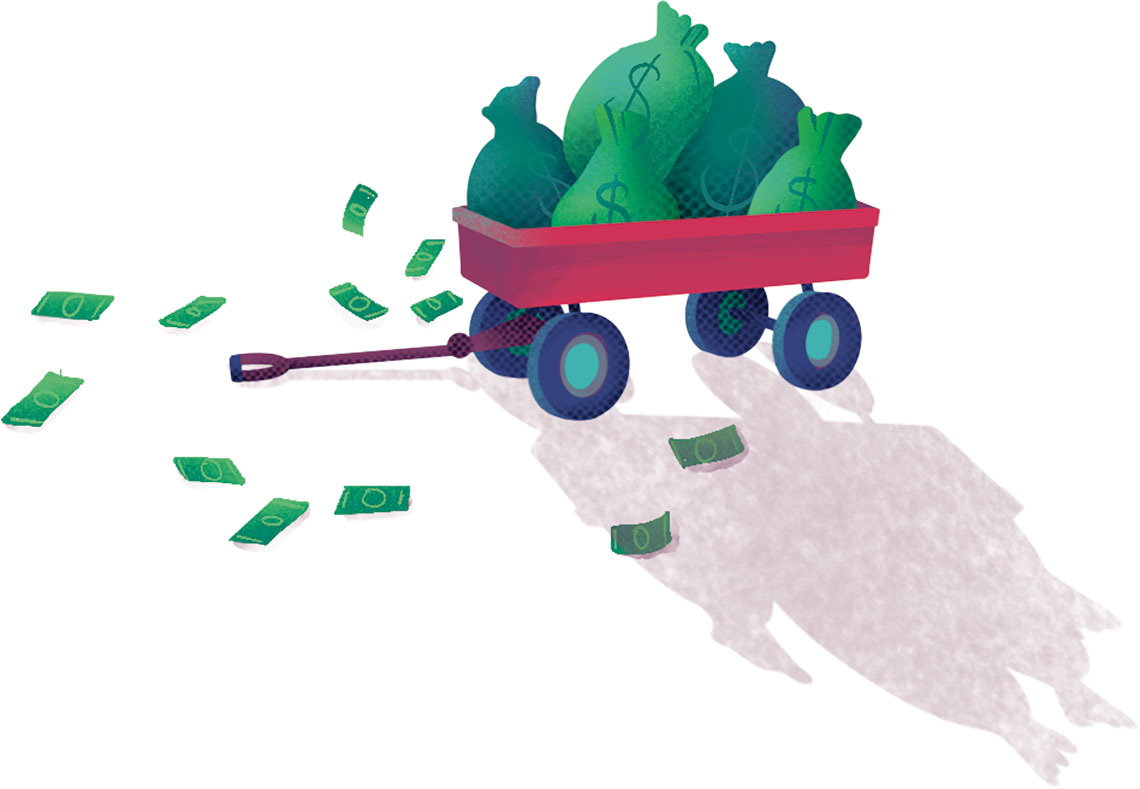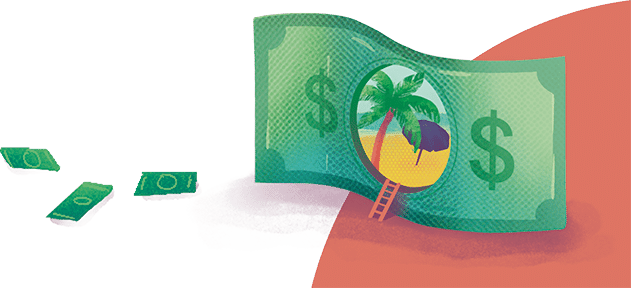
The best things in life
really are free
The best things in life really are free
Fall/Winter 2021 issue
We work to have more, feel stressed if we don’t have enough and dream of winning the jackpot so we’ll never have to worry about it again. But will a positive response to “Show me the money!” really make us happy?

Dr. Naomi Grant, PhD
Six years ago, the CEO of Gravity Payments Dan Price made headlines when he reduced his salary by $1 million in order to implement a $70,000 “minimum wage” for every single one of his employees. It’s a decision Price does not regret. Since then his business’s revenue has tripled, Price's company is now a Harvard Business School case study and his employees caused a mini real-estate boom when 10 times more of them were able to buy homes.
It’s clear that some money is good for everyone, but the idea that all the money (like Jeff Bezos' billions) will make you happy is actually false.
We spoke to Dr. Naomi Grant, PhD, an associate professor of psychology at MRU, about how happiness and what’s in our wallet are related.

Dr. Naomi Grant, PhD
Will winning the lottery or making a lot of money make a person happy?
“Not really,“ Grant says. “There’s a famous study called 'Lottery winners and accident victims: Is happiness relative?' that was done in the late '70s that found if you win the lottery you might get a blip in your happiness, but then you kind of go back to your baseline. We adapt to our life circumstances. If I win the lottery, or even if I get a big raise, I’m just going to adapt to that new situation and my happiness will go back to similar levels.”
Money can “buy” happiness, but mainly for those who don’t have enough in the first place, Grant says. Those who are worried day to day about being able to afford food and necessities will feel happier with more money. Wealthier nations such as Canada, Scandinavia, Germany, the Netherlands, Iceland, Australia and so on, report higher levels of happiness, however within those nations the research shows that having a higher income doesn’t make much of a difference to overall happiness if basic needs are being met.
A more recent study titled “Happiness, income satiation and turning points around the world” looked at global Gallup Poll data worldwide and tried to figure out the perfect amount of income for satisfaction and emotional well-being. It was found that “satiation (or fulfillment) occurs at $95,000 for life evaluation and $60,000 to $75,000 for emotional well-being.” There was a great variation in findings depending on where people lived, and researchers also found a detrimental effect — at least in certain nations — of having more than that “perfect” amount.
“I think the idea is, the more you have, the higher your expectations are going to be as well. If I’m making a ton of money, I ‘should’ be happy. And so, if I’m not, then I can end up even more unhappy,” Grant says.
“We’re always engaging in social comparison. If you have more money, you’re just going to be comparing yourself to a different population than you would be if you had less. If you live in a fancy neighbourhood, there’s always going to be somebody who has more money than you. With social media, we can now compare ourselves not only to our neighbours, but all the rich and famous people.”
Is there a magic amount of money you need for ‘happiness’ in retirement?
Dr. Jim Fischer, PhD, associate professor of finance in the Bissett School of Business, says the investment industry still suggests receiving 70 to 80 per cent of your pre-retirement income in retirement as the benchmark for being “comfortable.”
The number would include income from investments, pensions and government programs such as the Canada Pension Plan.
Fischer produced a research paper for the Academy of Financial Services in the U.S. that looked at whether popular investment strategies that have been followed for the last 50 years would provide the suggested 70 per cent of pre-retirement income in retirement.
The good news is that the model portfolio was found to provide an adequate retirement income.
What about how we spend our money?
“There are ways we can spend our money to make us happier as well. One study gave people $5 and said spend it on yourself or spend it on someone else. People were happier when they spent it on someone else,” Grant says.
Other research has shown that spending money on experiences, such as a concert, a vacation or a class, results in more satisfaction than spending money on material goods.
“If I renovate my kitchen, it’s really exciting for the first while, but then I get used to my new kitchen and I don’t really notice it anymore. But, if I spend it on a trip, then I get all those memories. I can talk about the trip to others, so there’s more of that social value as well.”

So, what makes us happy? Or, what is a more reliable precursor to happiness?
Universally, the most reliable antecedent for happiness is strong, supportive and meaningful relationships with friends and loved ones. Another is pursuing goals that are intrinsically valued.
“You value the goal personally as opposed to pursuing a goal that is more extrinsically motivated, where you think you ‘should’ do this,” Grant says. “If it’s something that’s personally motivating to you and you’re pursuing that, that’s going to bring you happiness,” such as doing things you enjoy doing, engaging in meaningful work, feeling gratitude and being kind.”
Reach out
It’s impossible to be happy all the time, of course, but everyone deserves to feel good about themselves. Connections help. Reach out to your alumni family.
If you feel like you are needing a bit more support for your happiness and mental wellbeing, there are resources available to you.
View resourcesRead more Summit
Cancelling commodification
Values-based marketing leading to more consumer satisfaction.
READ MORE


